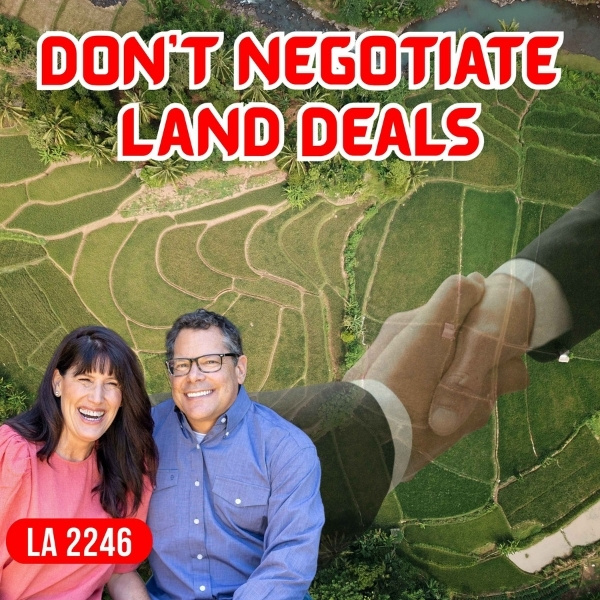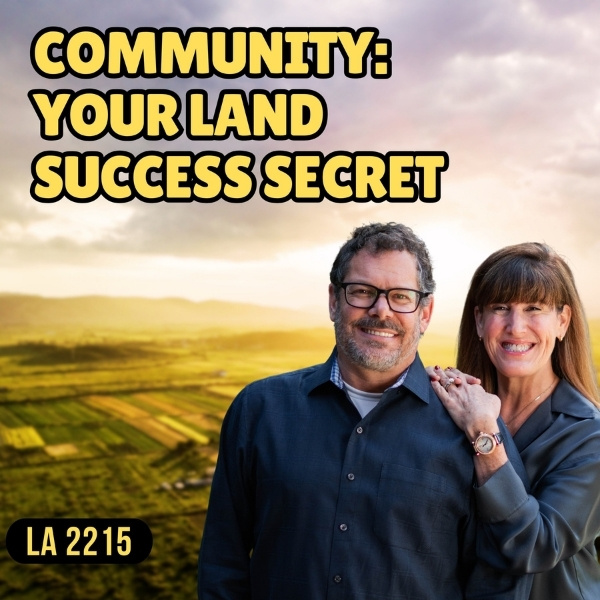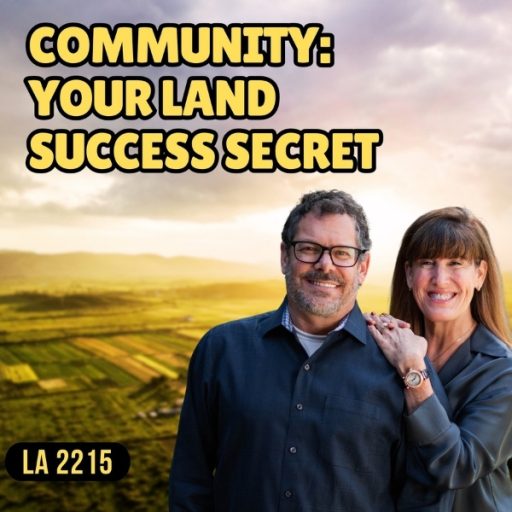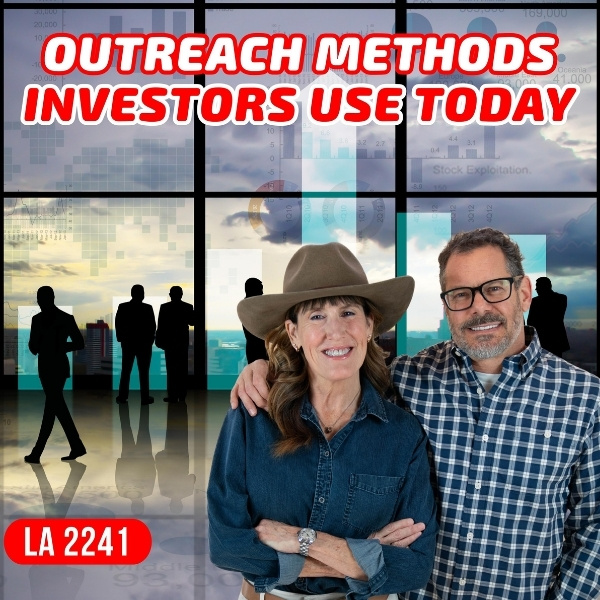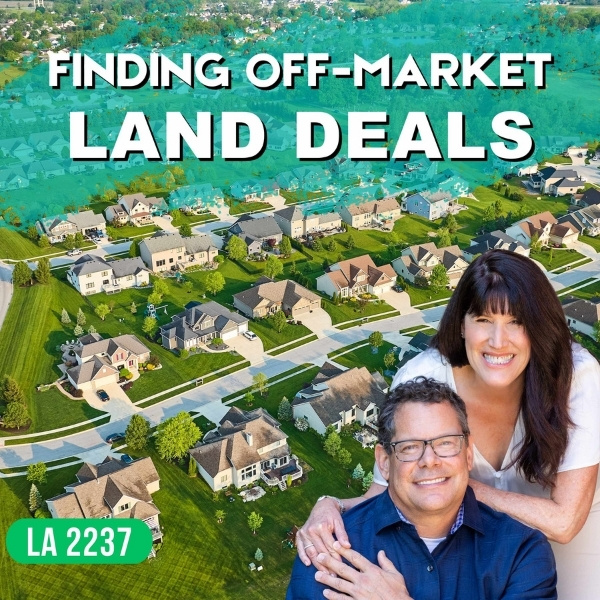This is episode number 2215. Jill and I are talking about why community is the secret ingredient to longevity in the land business. I would argue, in any business or any social situation, community is so important. We’ve both agreed. We usually don’t agree.
The Personal Need For Community
There are a few things that I go on record that I wish I had when I started. One of the things I did have was you. That was huge. You had nothing. You dreamt this whole thing up. Everything we do, our whole business model, how we find the deals, the direct mail, and all of that, you dreamt up on your own. It was like, “Let’s just see if this works,” and it did. What didn’t work, you tossed out, which is great. There’s a laundry list of things that got to me as this polished-up great thing. For Land Academy members, it’s even better. One of the things that I’ve often said is, “I wish I had a community.”
I didn’t have anybody to talk to about stuff. I didn’t have anybody I could call and say, “Have you ever had this experience before? What do I do with this thing? How do I get out of this jam? How do I answer this question?” I remember having a notepad. The closest I had to a community was one of the Debbies that I called, who was living in Colorado at the time. I had a 45-minute conversation with her. She brain-numbed me with everything she thought I should know, stepping into this role.
Do you want to explain the Debbies?
The Debbies are people who worked for Steven before me. There were several Debbies in different capacities, mostly as a transaction coordinator. That was a lot of the roles. You would get the deals together and pass them off to Debbie.
It was her actual name.
They were Debbies. It was just weird that there were a couple of Debbies. We don’t have a Debbie. I don’t even think we’ve ever had a Debbie. We haven’t had a Debbie since I came on board. It’s sad. Debbie became Jill or Jan. I had 45 minutes with Debbie. I remember I had a little spiral notepad. I was writing a flip page. She was explaining the assessor’s roles, what I need to do, how I deal with them, how I interact, what I need to get out of them, why I use them, the recorder’s roles, the zoning roles, and all the different people that I would talk to throughout the transaction, from seller, to county people, to escrow agents, to buyers. She didn’t have the sellers and the buyers part, but she had that middle part.
I had a one-person community for 45 minutes. That’s all I got. Everything else, I just had to wing it. I winged it and guessed or learned who to ask. I’m not afraid to do that. If I’m talking to someone and they’re not the right person, I’d say, “I have a real good understanding of planning and zoning now. Where can I go to get the answers to this?” Maybe they can help me. Maybe they can’t. I’d figure it out. This is probably part of the topic, which is community. Having that community to help you is monumental.
I have some examples, and we’ll talk about them in a few minutes after the question of being in a positive professional community and a negative one.
I haven’t had a negative one.
It’s important for you to decide if you belong in that community or not. It’s harder because there are communities on the internet. It’s an internet community. It’s a little different. By the way, this week, all week, is Better Advice Week. Last week was Sort of Good Advice. In the previous episode, we talked about understanding land market cycles and acting accordingly. In this episode, it is about why community is a secret ingredient for longevity in land investment.
In the next episode, we’ll talk about, “Is flipping rural land still a good strategy in 2025?” Next to that will be the easiest way to fund your land deals without using your own money, which I would highly recommend in the beginning, not using your own money. The final topic will be about the role of persuasion in buying and selling. Jill is going to inform us about personality, persuasion, winning people over, and making friends. Each day on the show, we answer a question from our Land Academy member Discord forum and take a deep dive into land-related topics at your request.
Alex wrote, “Do people actively use social media outside of straight selling? The example that comes to mind is brand building. If so, do you manage a calendar for your social posts? Is there a platform you use to auto-generate posts? If so, what’s working for you?” This is a good question and perfect for people in our community. I hope there are a lot of good responses on that. I’m going to go first with number one. For us personally, in our land-selling community, I have to full transparency admit, I have gotten lazy on it because my buyers list is so good. I often sell properties before I get to this point. That’s only because of our longevity that we’ve built up over the years. However, I do love this.
I have three examples of social posts. I love this question, and we should do a whole show on it.
It is important. Outside of selling, it helps build up your credibility when you’re talking about what you do as a person, not just, “Buy this land.”
Community As A Social Media Strategy
Let me give you three examples of a social media post. Jill, please respond verbally, but I would like the readers to think about what you would be most interested in, not just in reading the posts, but whether you would follow this person. 1) I have a piece of land for sale in Arkansas for $22,000. You need to take a look at this. You see that everywhere. 2) I’m going to make a million bucks on this deal. Here’s how. 3) I’m a real person. I just got off the phone with the seller. It looks like we’re going to put a deal together, but there are three or four things that I’m going to have to overcome. I might need somebody’s help on it in the selling land community. Which one would you rather respond to or be involved in?
I like two and three.
I can’t stand one and two, particularly number one. It reminds me of a real estate agent. “Look at this amazing house I listed.” I hate that. It’s everywhere. It’s so generic and silly. That’s old-school sales. “We just got the new Chevrolets in. Come on down.” Nobody wants that. With the second one, I don’t care if you’re going to make a million bucks.
The third one is engaging me. “Really? You’re down the path with this seller, and you think you’re going to do the deal, but there are three things you need to overcome. I’d like to be a part because I’ve had that happen, too. I know if it hasn’t happened to me in the past.” That’s what I think. Please correct me if you think it’s different, Jill. Branding yourself is providing information, asking for help, being part of a community, and engaging yourself in what’s happening in the land investment community, or any other community. Do you think people just want to see pretty stuff?
No, I agree. When you’re talking about the land, and one of the things I love, Alex, is that when members successfully post sold properties, who bought it, what they’re going to do with it, and stuff like, “This is what this person bought. They said they’re going to build their dream cabin with a ranch,” these tell stories and helps other buyers going, “That’s what I want to do, too. Do you have any more of those, Alex?” I love success sales stories.
I separate posts into two different categories. Number one, what so many people out there are really saying is, “I’m amazing. Look at this dress that I have. I am amazing. Look at this property I just listed. I’m amazing.” That turns me off in one second. “Here’s this process that I’m going through in my life. It’s not perfect, and let’s engage somehow.” I think that’s the separate, much more in the minority types of posts.
To answer your question, too, Alex, in case they don’t, we moved on from Hootsuite. We were using Hootsuite, so I can’t remember what the latest one is, but there are plenty of great platforms to help you auto-post. You create the graphic. You create the video. You create the thing, and you load it. You have different formatting for Facebook, Instagram, X, and all of that. It’ll help you do that, and I love those. Invest in something like that. It makes a big difference.
The tools to use this stuff are ever-changing, constantly progressing, and making it easier.
Yes, especially with AI.
The Transformative Power Of A Positive Community
What they won’t do is create the message that you’re sending, at least yet. Our topic is why community is a secret ingredient to longevity in your land business. When I started in real estate, right when I got out of college, I had a couple of simple accounting jobs. It ended up being an amazing opportunity in commercial real estate in the very early ’90s in Detroit. There was a real estate recession going on, like the cycles we talked about in the previous episode.
I was in with a group. It was full commission. I got in with a group where we all wore suits. There were a couple of guys in the office that have done well financially, so everybody had expensive cars. There was another guy and I who were just starting. I had the worst car that you can ever imagine, parking in the back so nobody could see it. We used to call it burying the car. I thought in the beginning that it was an amazing community. To some degree, it was. It got me familiar with knowledge. I heard a lot of stories, but it was largely much older people than me who could not type or use a computer in any way, telling stories about the good old days and how it was probably never going to be like that again.
It wasn’t a community where I could go to those guys and say, “There’s this new technology called data sets and things with data. Have you ever thought about utilizing that?” They would just laugh. That community didn’t raise me. They didn’t have any answers for me, and they couldn’t identify with what I was going through. What they were doing when I look back on it was complaining. They would complain that times have changed and they’re not making as much money as they used to. Every old man has had some version of that going on.
Eventually, I sold a bunch of nursing homes to a group in Arizona, and they offered me a job. They’re at the infant stages of taking the company public. These are very intelligent people. One was a former CEO of the healthcare system here in Arizona. There was an accountant and an operations person. Together with probably nine or ten of us, we took that company public. What an experience in a community that was.
This is one of my big gripes about working from home. You just miss out on all these experiences. I would like to think, to some degree, that we have created a community here, Jill and I, Land Academy, where we are providing this positive environment for people to ask questions and get deals done. Jill and I are always willing to fund your deals, which we’ll talk about in a couple of episodes. Community is the make-or-break scenario. How many times have your parents said to you when you were young, “I don’t think you’re in the right crowd?” Community matters.
I wish I had our community when I was getting started. It would have been nice. It’s so amazing, too, because we’re all working toward the same thing. We all have the same goals. People who have come in have such a variety of backgrounds. People work for the planning and zoning in different counties in our group. We have people who have a forestry background, an architecture background, all forms of real estate background, and other successful business owners, too. Everything brings something to the table. We can all learn something. You need to be in the right community that’s going to bring you up, too. That’s the whole thing.
This is not a community that is in any way negative or anything like that. You and I have accidentally successfully created a very nurturing and supportive community where we all work together. We all believe in the abundance mindset. We help each other. It’s so nice. Every time someone on a Thursday call says, “I live right by there,” or “I can go look at it for you if you want,” I’m like, “That’s so great.” Someone can say, “I know this area. Here’s what’s going on, and you need to know that.” I’m like, “These are invaluable tips and help.” It’s not only real hands-on knowledge, but it’s also support, encouragement, and motivation.
Remember the 4:00 AM Club. We have a group of people who I’m sure are always in there at some point. Our community is all around the world, not just here in the United States. Pretty much any time, day or night, you can log in to our community. There’s somebody there and someone you can talk to. Over the years, we have had different groups of the 4:00 AM Club. “Am I the only one up, doing this right now? Is this the time I have to look at my deals and get questions answered before I start my day, get the kids up, and go to my job?”
By leaps and bounds, Jill and I have created a community between the two of us. Jill is so much better at some of the stuff that I’m not good at at all. The social piece to this and the non-real estate piece, even though she has a background in that, which was helpful, we were just better together. She usually does the deals on her own. For years, she has been without my involvement.
Jill said, “I’ve got two people interested in this asset that we’re going to sell. How much input do you need or want about the sale price? It’s been on the market for a while, but we bought it so cheaply. I know we’re going to make money.” I said, “I honestly don’t care.” She picked up her stuff, left, and said, “Thank you.” She didn’t even need to do that, but for whatever reason, and this is a compliment, she just needed some type of okay.
I want to make sure that you’re okay with that. That was respect for you, not because I needed it. It was like, “I don’t need it, but I want to make sure I’m not stepping on your toes.” There are deals that you have a passion for.
If you bounce something off of somebody else whom you respect and have some history with, and they don’t like it, then you better listen. If they like it, then you just think it’s better if you’re making some type of financial decision. “Should I go this direction with this land deal?” If you have a few people to ask about, that’s valuable, especially if they have a ton more experience than you do. Community matters. It’s a huge thing. Join us in the next episode where we discuss, “Is flipping rural land still a good strategy in 2025?” You are not alone in your real estate ambition. We’re Jack and Jill, information and inspiration to buy undervalued property.
